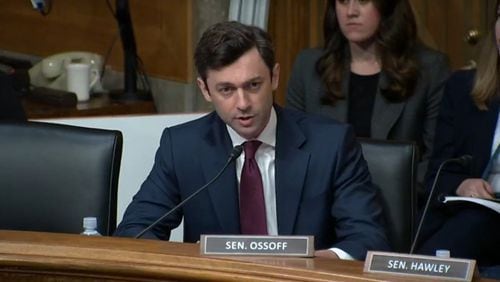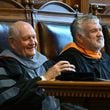The instigating incident of Ladee Hubbard’s novel “The Talented Ribkins” occurs when aging Johnny Ribkins sees a young boy hurling cans at his niece Eloise’s head. He panics until the girl reveals an unerring ability to catch them out of the air.
Johnny is struck less by Eloise’s skill than the realization that she shares with the rest of the Ribkins family a talent that could almost be considered a superpower.
“That was something a lot of folks in the family shared. Little sparks of something special that didn’t seem to make much sense and had generally caused more confusion than anything else. Because not knowing what to do with these gifts, many of them spent years trying to understand them, trying to figure out where they belonged and who they were. They were Ribkins.”
With the title “The Talented Ribkins,” Hubbard riffs on W.E.B. Du Bois’ 1903 essay “The Talented Tenth,” about the importance of education to African-Americans leadership. With her first novel, Hubbard introduces characters with more outlandish talents than academic or business achievement. Johnny’s relatives have such abilities as scaling walls or “spitting firecrackers,” and some have nicknames like “The Hammer” or “Captain Dynamite.”
A quirky, bittersweet comedy, Hubbard’s novel offers an original perspective on the legacy of the civil rights movement, but its parallel tour of Johnny’s past and Florida locales seems to spin its wheels.
A spry 72 year-old, Johnny has a talent for creating maps of places he’s never seen, which he’s been using for illegal purposes. He’s been caught skimming from his criminal employer and given a week to pay off his debt. Fortunately he’s left secret caches of cash and valuables buried around Northern and Central Florida, and retrieving one leads him to Eloise, the niece he never knew he had, who’s never met the Ribkins side of the family.
Unaware of Johnny’s risky situation, Eloise joins him on the road so they can build up the family connections. Pairing a morally sketchy older guy on a road trip with a seemingly innocent girl, “The Talented Ribkins’” structure resembles such con man movies as “Paper Moon” and “Matchstick Men.” The difference is that Johnny tries to atone for his recent misdeeds.
In the book’s most compelling passages, Johnny reminisces about his youthful glory days with The Justice Committee, “a group of people trying to do what they could to keep their heroes safe.” The small league begins with Ribkins relatives and friends guiding civil rights protesters safely through the segregation-era South in what they call “the freedom-of-movement movement.”
Hubbard crafts an irresistible idea of activists with de facto superpowers challenging the racist power structure of mid-20th century America. But the author relegates this part of the story mostly to brief flashbacks and second-hand conversations.
The Justice Committee broke up when its attempts to raise money to affect real social change went askew. Perhaps Hubbard’s offering a metaphor for the civil rights movement’s evolution, and how championing integration and voting rights had a clarity that became more ambiguous in the late 1960s and 1970s.
In the novel’s most puzzling detail, Johnny recalls trying to create a map that could plot out a successful future for his friends and family, but seems to face resistance from a second, unseen map that’s bound to the wealthy white status quo. The notions never seem to snap into focus, though.
As Johnny retraces his old steps, literally digging up remnants of his past, the reader soon realizes that he’ll painstakingly reconnect with all of the surviving members of Justice Committee. Johnny’s perspective allows him to reflect on his past triumphs and mistakes, his nostalgia going hand-in-hand with regret.
But it also saddles the book with a largely passive protagonist, no matter how many miles he drives or holes he digs. It’s like the difference between watching someone remember things versus actually doing things. Johnny gradually uncovers political conspiracies and paternity secrets, but it’s hard to invest much emotionally in his journey.
For a comparable novel with more active heroes, consider Matt Ruff’s “Lovecraft Country,” which has African-American colleagues outmaneuvering racist forces and sinister occultists in the Jim Crow era.
Winner of the Rona Jaffe Foundation Award and the Faulkner-Wisdom Creative Writing Competition, Hubbard shows a keen eye for the Florida locations as Johnny and Eloise ramble from beaches to botanical gardens, from no-income housing to lavish communities.
Hubbard also takes creative approach to the complexity of heritage. The family name “Ribkins” comes from deceased patriarch nicknamed “The Rib King,” whose keen sense of smell led him to market a popular line of barbecue sauce. His success offers a point of pride and family lore, while the sauce’s packaging included a racial caricature the surviving Ribkins have to live down.
The book includes a likable cast of characters, including a pair of toughs who tail Johnny but amusingly subvert the clichés for criminal henchmen. And while parts of the book manage to be at once vague and repetitive, the heart of the story has genuine warmth as Johnny rediscovers his idealism while encouraging Eloise to respect her own gift.
But “The Talented Ribkins” also leaves the reader with a nagging suspicion that the best part of the story remains just over the horizon.
FICTION
‘The Talented Ribkins’
By Ladee Hubbard
Melville House
295 pages, $25.99
About the Author






